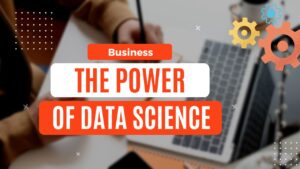Table of Contents
In today’s digital age, data is king. The implementation of data science is crucial in today’s digital age for every business. Every click, purchase, and interaction generates valuable data that businesses can harness to gain insights, make informed decisions, and drive growth. In this blog post, we’ll explore how data science can unleash the untapped potential within businesses and propel them towards success.
Understanding Data Science in Business
Data science is the practice of analyzing and interpreting complex data to extract valuable insights and information. In a business context, data science involves using advanced analytics, machine learning, and statistical techniques to make sense of large volumes of data. This enables businesses to uncover patterns, trends, and correlations that can inform strategic decisions and drive business growth.
The importance of data-driven decision-making cannot be overstated. By leveraging data science, businesses can gain a deeper understanding of their customers, optimize operations, identify new market opportunities, and mitigate risks. From retail and healthcare to finance and manufacturing, data science is transforming industries across the board.
The impact of Data Science in driving Business Growth
Data science plays a pivotal role in driving business growth and expansion. Businesses can learn about consumer behavior, interests, and purchase trends by examining customer data.
This enables them to tailor their products and services to meet the evolving needs of their target audience, ultimately driving customer satisfaction and loyalty.
Furthermore, data science can help businesses identify emerging market trends and opportunities for innovation. By analyzing market data and competitor insights, businesses can stay ahead of the curve and capitalize on new growth opportunities before their competitors do.
Harnessing Data Science for Competitive Advantage
Data science can provide businesses with a significant advantage by enabling them to make data-driven decisions faster and more accurately than their competitors. By leveraging predictive analytics, businesses can anticipate market trends, forecast demand, and optimize pricing strategies to stay ahead of the competition.
Moreover, data science can empower businesses to personalize the customer experience and deliver targeted marketing campaigns that resonate with their audience. By analyzing customer data and segmentation, businesses can identify high-value customers, tailor their messaging, and improve customer engagement and retention.
Data Science Implementation Strategies
Implementing data science initiatives within a business requires careful planning and execution. Consider the following important steps:
- Define clear business objectives: Identify the specific goals and objectives you want to achieve through data science initiatives.
- Collect relevant data: Gather relevant data from various sources, including internal databases, third-party sources, and external data sources.
- Choose the right tools and technologies: Select the appropriate tools and technologies that align with your business needs and objectives.
- Build a skilled team: Hire or train data scientists, analysts, and engineers with the necessary skills and expertise to execute data science projects effectively.
- Start small and scale up: Begin with small-scale data science projects to test hypotheses and validate assumptions before scaling up to larger initiatives.
Challenges and Solutions
While data science offers immense potential for businesses, it also comes with its fair share of challenges. Common challenges include:
- Data quality and consistency
- Data privacy and security
- Talent shortage and skills gap
- Integration with existing systems and processes
To overcome these challenges, businesses can:
- • Fund procedures for quality control and data governance.
- Implement robust data security measures and compliance frameworks.
- Give staff members opportunity for continued training and professional growth.
- Partner with experienced data science consultants or service providers.
Real-world Examples
To illustrate the power of data science in business, let’s look at some real-world examples:
- Netflix: By analyzing user data and viewing habits, Netflix can recommend personalized content to its subscribers, leading to increased engagement and customer satisfaction.
- Amazon: Amazon uses data science algorithms to optimize its product recommendations, pricing strategies, and inventory management, resulting in higher sales and customer retention.
- Spotify: Spotify leverages data science to create personalized playlists and recommendations for its users, enhancing the music streaming experience and driving user engagement.
Conclusion
In conclusion, data science has the potential to revolutionize businesses and unlock new opportunities for growth and innovation. By harnessing the power of data, businesses can make smarter decisions, gain a competitive edge, and drive sustainable success in today’s digital economy. Whether you’re a small startup or a large enterprise, investing in data science capabilities can be the key to unlocking your business potential and staying ahead of the competition.
